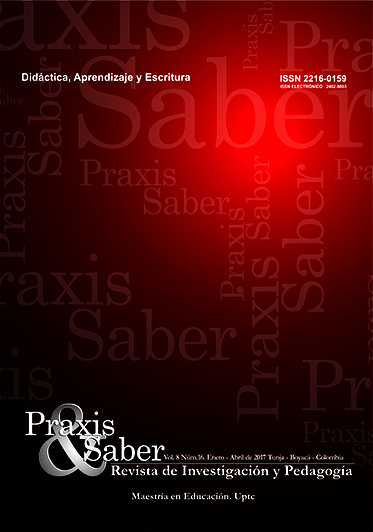Governance of writing: the scission between modernity and hypermodernity “cite and parentheses”

Abstract
Nowadays Academic writing reflects the scission between modernity and hypermodernity. In the early modernity writing had as aim to show the constant thinking battle the writers dealt with. Sciences preeminence, scientific society’s role, the birth of a researcher individual and the emergence of scientific journals encourage the use of footnotes. Parentheses are imposed by technology power and a society of control. The present paper holds that today’s writing shows simple thoughts, absence of intensity and plasticity of the appearance. Contemporary practices of academic writing show the writing governance whose practices give the importance to topics about thinking issues.Keywords
modernity, hypermodernity, academic writing, university, professor
Author Biography
Armando Zambrano Leal
Doctor en ciencias de la educación Universidad Lyon-Paris 8 (Francia)
References
- ALAIN. (2007). Propos sur l’éducation, Paris, Quadriage.
- CHERVEL, A. (1988). L'Histoire des disciplines scolaires. Réflexions sur un domaine de recherche. Revue d’Histoire de l’Éducation ; INRP, N° 38, mai 1988, pp. 59-119.
- FOUCAULT, M. (2005). Vigilar y castigar. Nacimiento de la prisión. México, siglo XXI, Editores
- GADAMER, HANS-GEORG. (2001). Verdad y método. Salamanca, Sígueme.
- GARCÍA, A. (1997). Sobre el sujeto. En Las identidades del sujeto. Valencia, Pre-textos
- HAMELINE, D. (2003). Modernidad y Educación. En, Educación y filosofía. Enfoques contemporáneos. Buenos Aires, Eudeba
- HEIDEGGER, M. (2005) Qué significa Pensar, Madrid, Trotta.
- JAMESON, F. (2004). Una modernidad singular. Ensayo sobre la ontología del presente. Barcelona, Gedisa.
- JÓDAR, F. (2007). Alteraciones pedagógicas: Educación y políticas de la experiencia. Barcelona: Laertes.
- LIPOVETSKY, G. (2004) Les temps hypermodernes, Paris, Grsset
- LYOTARD, JEAN-FRANÇOIS. (1986) Le posmoderne, Paris, Editions Galilée.
- MONTAIGNE, M. (2004) Les Essais, Paris Puf/Quadriage,
- PROST, A. (2000). Histoire et sociologie du savoir. En Savoirs et compétences, bajo la dirección de Ruano-Borbalan, Jean-Claude, Actes du forum, Quercy, Francia, Editions Demos, p.34
- ROUSSEAU, JEAN-JACQUES. (1971) España, Editorial Bruguera.
- SLOTERDIJK, P. (1999) Règles pour le parc humain, Paris, Mille et une nuit
- SLOTERDIJK, P. (2000) Le penseur sur scène, Paris, Christian Bourgois Editeur.
- SOËTARD, M. (2003). Naturaleza y libertad en educación. En, Educación y filosofía. Enfoques contemporáneos. Buenos Aires:Eudeba
- ZAMBRANO, A. (2011). Pedagogía y narración escolar. El declive de los conceptos. Córdoba (Argentina), Editorial Brujas.
- ZAMBRANO, A. (2014). Ser docente y sociedad de control “lo oculto en lo visto”. Praxis & Saber. 5(9). 149 – 164. https://doi.org/10.19053/22160159.2999 DOI: https://doi.org/10.19053/22160159.2999
- ZAMBRANO, A. (2016). Pedagogía y didáctica: esbozo de las diferencias, tensiones y relaciones de dos campos. Praxis & Saber. 7(13), 45 – 61. https://doi.org/10.19053/22160159.4159 DOI: https://doi.org/10.19053/22160159.4159
Downloads
Download data is not yet available.